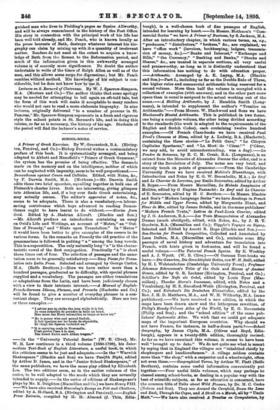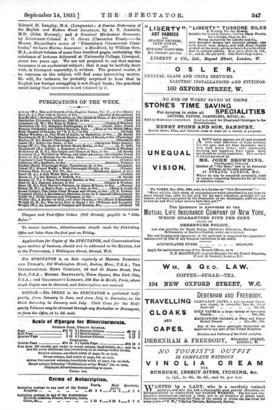SCH001,1100S.B.
A Primer of Greek Exercises. By W. Greenstock, B.A. (Riving- ton, Percival, and Co.)—Bishop Percival writes a commendatory preface of this book. It is systematically arranged, and being adapted to Abbott and Mansfield's " Primer of Greek Grammar," the system has the promise of being effective. The demands made on the memory and on the intelligence, neither of which can be neglected with impunity, seem to be well proportioned.— Demosthenes against Conon and Cal/icles. Edited, with Notes, &c., by F. Darwin Smith, M.A. (Methuen.)--Mr. Darwin Smith edits these two brief speeches, equalling together in bulk one of Plutarch's shorter Lives. Both are interesting, giving glimpses into Athenian life, and, if a boy ever finds Greek entertaining, may actually amuse. The editor's apparatus of notes, &c., seems to be adequate. There is also a vocabulary,—a labour- saving contrivance which boys advanced to reading Demos- thenes ought to have learnt to do without.—Stories from Ovid. Edited by A. .Hadrian Allcroft. (Blackie and Son.) —Mr. Alleroft prefixes an introduction containing an essay on Ovid's Life and Writings, an account of "Metre," an " Out- line of Prosody," and " Hints upon Translation." In " Metre " it would have been better to give examples of the ensure in its various forms. In the remarks on Prosody the old practice of the grammarians is followed in putting " a " among the long vowels. This is a superstition. The only naturally long " a " is the charac- teristic vowel of the first conjugation. Practically " a " is short three times out of four. The selection of passages and the anno- tation seem to be generally satisfactory.—Easy Pieces for Trans. lation into Latin Prose. Selected and arranged by George Carter, M.A. (Belie Brothers.)—Here we have rather more than a hundred passages, graduated as to difficulty, with special phrases supplied and a vocabulary. The passages are either translations or adaptations from the Latin, and have been judiciously chosen with a view to their intrinsic interest. —A Manual of English- French-German Idioms, Phrases, and Proverbs (Hachette and Co.) will be found to give a number of everyday phrases in a con- venient shape. They are arranged alphabetically. Here are two or three examples :— "I advise you to strike the iron while it is hot. Je vons conseine de prendre Is balle an bond.
Man muss des Eisen sehmeiden so huge es helm ist."
" He is penny wise and pound foolish.
II fait Cpargne sur les boats de chandelle* Er !Mgt des Sparest verkehrt an."
"It is carrying coals to Newcastle. Vest porter ream 1 la mer. Dee heisst Enlen nach Athen trairen."
—In the "University Tutorial Series" (W. B. Clive), Mr. W. H. Low continues in a third volume (1660-1798), his Inter- mediate Text-Book of English Literature, a useful book, in which the criticism seems to be just and adequate.—In the " Warwick Shakespeare" (Blackie and Son) we have Twelfth Night, edited by Arthur D. Imes, and in the "Junior School Shakespeare," of the same publishers, we have the same play edited by Elizabeth Lee. The two editions seem, as in the earlier volumes of the series, to be well adapted to the needs which they are severally intended to supply.—In the series of editions of Shakespeare's plays by Mr. K. Deighton (Macmillan and Co.) we have Henry VIII. —We have also received Macaulay's Essays on Pitt and Chatham, edited by A. Holland, B.A. (Rivington and Percival).—English Prose Extracts, compiled by H. H. Almond (J. Thin, Edin- burgh), is a well-chosen book of fine passages of English, intended for learning by heart.—In Messrs. idethnen's " Com- mercial Series " we have A Primer of Business, by S. Jackson, M.A. After an introductory chapter, in which various terms, as, e.g., " producers," "distributors," " brokers," &a, are explained, we have "office work" (invoices, bookkeeping, ledgers, transmis- sion of money, &c.).—" Banks and Interest," " Exchange and Bills," " the Currency," " Banking and Banks," " Stocks and Shares," isc., are treated in separate sections, all very useful and praiseworthy, as long as it is distinctly understood that this information has nothing to do with education proper. —Arithmetic. Arranged by A. E. Layng, M.A. (Blackie and Son.)—Part L, including as far as the Double Rule of Three, the higher rules and commercial arithmetic being reserved for a second volume. More than half the volume is occupied with a collection of examples (with answers), and in the other part more space than is usual is assigned to the actual working out of the sums.—A. Shilling Arithmetic, by J. Hamblin Smith (Long- mans), is intended to supplement the author's "Treatise on Arithmetic."—From Messrs. W. Blackwood and Sons we have Biackwood's Mental Arithmetic. This is published in two forms, one being a complete volume, the ether being divided according to the standards (the work is. adapted to the requirements of the English and Scotch Codes), each containing twelve hundred examples.—Of French Class-books we have received Paul Feval's Chouans et Bleus, edited by A. Ludwig, B.A. (Hachette), containing the three stories—" Le Petit Gars," " Le Citoyen Capitaine Spartacus," and " La Mort: de Cesar.' " (' Cesar, we may add, to avoid misunderstanding, was a dog).—La Poudre de Soissons, by E. C. M. Creak, B.A. (Longmans), is an extract from the Memoirs of Alexandre Dumas the elder, and is a story of the Revolution of July. The notes are very brief, and scarcely touch on points of grammar.—From the Cambridge University Press we have received Moliere's Misanthrope, with Introduction and Notes by E. G. W. Braunholtz, M.A. ; Le Serf and Le Chevrier de Lorraine, par Emile Souvestre, edited by Arthur R Ropes.—From Messrs Macmillan, Le Malade Imaginaire of Moller°, edited by G Eugene Fasnacht : Le Serf and Le Chevrier of E. Souvestre, edited by H C Berthon.—In Messrs. Blackie and Son's " Modern Language Series " we have Readings in French for Middle and Upper Forms, edited by Marguerite Ninet, and Fleur de Mer, edited by James Bolelle, and in the same publishers' "Modern French Texts," Lettres de Paul-Louis Courier, edited by J. G. Anderson, B.A.—Les Trois Mousquetaires of Alexandre Dumas (much abridged), edited, with Notes, &c., by J. H. T. Goodwin, B.A. (Macmillan and Co.); TOppfer's Voyages en Zigzag, Selected and Edited by Ascott R. Hope (Blackie and Son.)- Sea-Stories for French Composition, Collected and Annotated by Leon Delbos, M.A. (Macmillan and Co.), contains some fifty passages of naval history and adventure for translation into French, with hints given in foot-notes, and will be found a useful volume.—The Tutorial French Syntax. By E. Weekley and A. J. Wyatt. (W. B. Clive.)—Of German Text-books we have : —Die Ganerben, Die Gerechtigkeit Gottes, von W. H. Real, edited by H. I. Wolstenholme (Cambridge University Press); Professor Johannes Schrammen's Tales of the Gods and Heroes of Ancient Greece, edited by G. R. Lochner (Rivington, Percival, and Co.); Schiller's Der Neffe ale Onkel, edited by Louis Dyer (Mac- millan) ; Theodor Storm's Immensee, edited, with Notes and a Vocabulary, by H. S. Beresford-Webb (Rivington, Percival, and Co.); and Kotzebue's Die Deutsehen Kleinstddter, edited by the Rev. J. H. D. Matthews, M.A., and W. H. Witherby, M.A. (same publishers).—We have received a new edition, in which the maps have been drawn anew and the letterpress rewritten, of Philip's Handy-Volume Atlas of the World, by E. G. Ravenstein (Philip and Son) ; and the "school edition" of the same pub- lishers' Systematic Atlas. We wish that we could get adequate maps of the important European countries. Why should we not have France, for instance, in half-a-dozen parts P—School Geography, by James Clyde, M.A. (Oliver and Boyd, Edin- burgh), appears in a twenty-fifth edition, thoroughly revised. As far as we have examined this volume, it seems to have been well "brought up to date." We do not quite see what is meant by saying that in England the villages are "inhabited chiefly by shopkeepers and handicraftsmen." A village seldom contains more than "the shop," with a carpenter and a wheelwright, often not even these.—Geographical Terms, by Arthur W. Platt (Relfe Brothers), contains some useful information conveniently put together.—Four useful little volumes, which may perhaps be classed among school-books, as dealing in a popular way with the best of scientific subjects, as far as education is concerned, have the common title of Talks about Wild Flowers, by Dr. M. C. Cooke (Nelson and Son). They are Around the Cornfield, Down the Lane and Back, Through the Copse, and A Stroll on a Marsh, all by "Uncle Matt."—We have also received A Treaties on Computation, by Edward M. Langley, M.A. (Longman) ; A Concise Dictionary of the English and Modern Greek Languages, by A. N. Jannaris, M.D. (John Murray) ; and A Practical Hindustani Grammar, by Lieutenant Colonel A. 0. Green (Clarendon Press).—In Messrs. Macmillan's series of "Elementary Commercial Class- books," we have Marine Insurance : a Handbook, by William Gow, M.A.., a short volume of some four hundred pages, containing the substance of lectures delivered at University College, Liverpool, about two years ago. We are not prepared to say that marine insurance is an academical subject ; that it may be usefully dealt with, in Liverpool especially, is evident. The general reader, if he ventures on the subject; will find some interesting matter. He will, for instance, be probably surprised to hear that in English law foreign smuggling is not illegal trade; the practical result being that insurance is not vitiated by it.



































 Previous page
Previous page